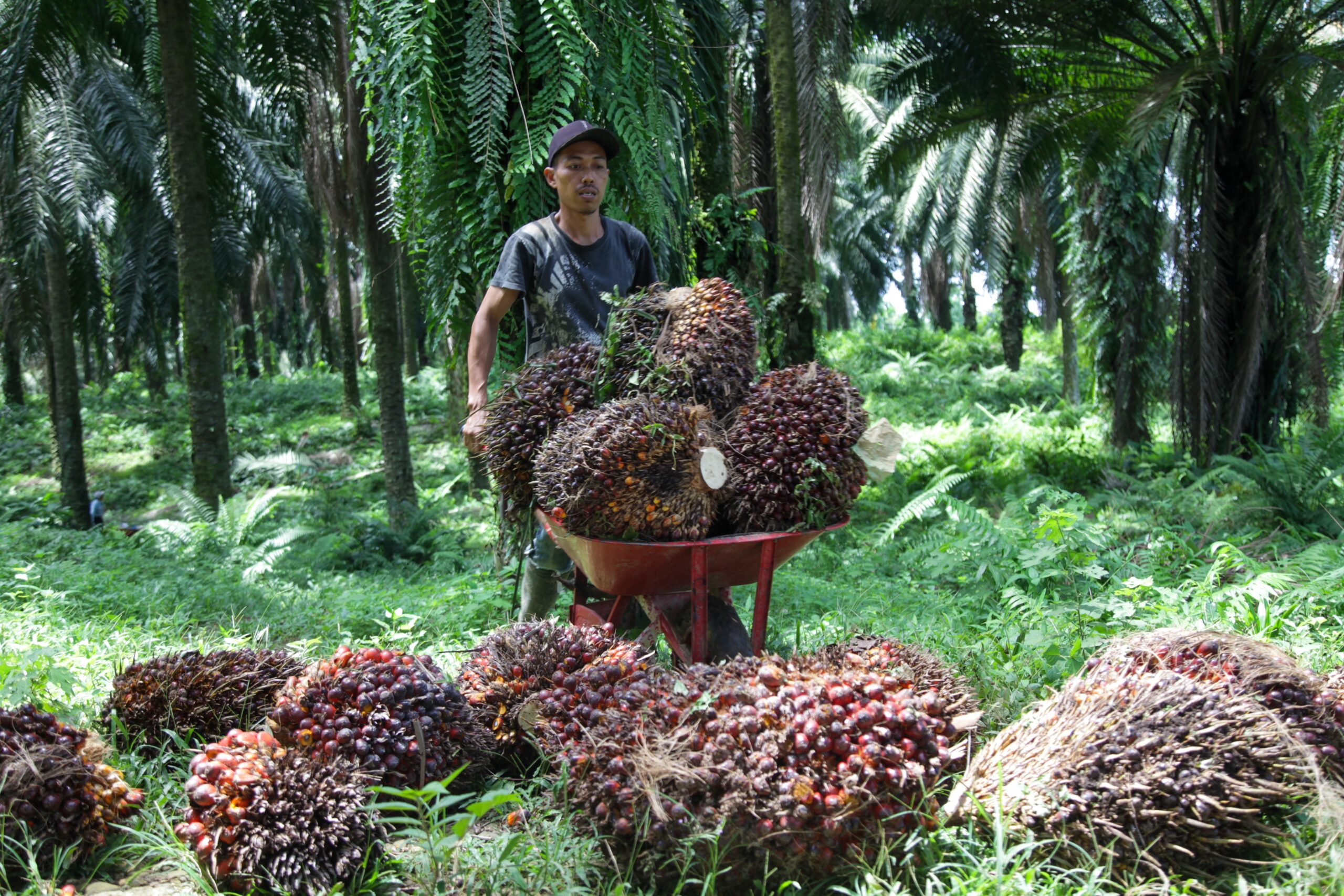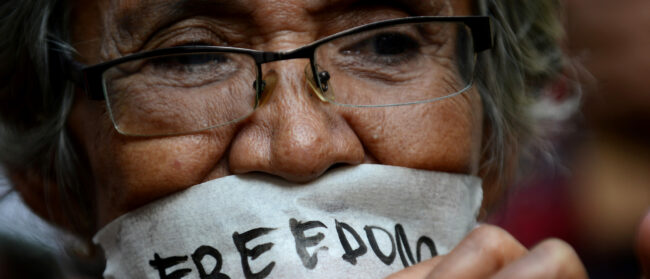Just days after Indonesia ordered biodiesel producers to add more palm oil to fuel, a national farmers union is contending the policy is a billion-dollar giveaway to major agribusinesses at the expense of smallholders on the heels of a chaotic year for the country’s top export.
Indonesia’s biodiesel programme is known as B35 and, as of 1 February, it now requires a biodiesel blend of 35% palm-based fuel – a level unmatched in biofuel mandates around the world. The programme is meant to incentivise biodiesel production for domestic use through subsidies funded by the country’s palm oil export tax.
But a new report from palm oil farmers union SPKS asserts that some of the very same companies that pay these export taxes end up making back the money and much more through biodiesel subsidies, to the tune of upwards of $1 billion in profits. Almost a year after a full-on export ban sparked nationwide protests, the union’s report paints these subsidies as effectively nullifying a key export control.

“This is a program that benefits conglomerates. Why? Because with the subsidies they get, they will expand their refineries,” said Mansuetus Darto, secretary general of SKPS.
Palm oil giant Wilmar received nearly three times the amount in subsidies compared to what it paid in export levies, the report states, making about $950 million in profit from January 2019 to September 2021. Fellow palm oil producers Darmex Agro, Sungai Budi and Permata Hijau also made net profits through government biodiesel subsidies, according to the report.
Indonesia’s palm oil fund management agency BPDPKS, the Indonesian Palm Oil Association and Wilmar did not respond to requests for comment in time for publication.
The union is considering filing a complaint with the Constitutional Court to clarify if it is legal for Indonesia’s Palm Oil Fund Management Agency to allocate funds toward biodiesel subsidies.

A chart from the report by palm oil farmers union SPKS shows the amount (IDR) companies received in biodiesel subsidies, in red, compared to what they paid in export levies, in yellow. Image credit SPKS.
How the biodiesel blending program works
On 1 February, Indonesia implemented a new biodiesel blending requirement, upping the mandated amount of biofuel derived from palm oil from 30% to 35%. The new program is expected to increase domestic consumption by about 1.8 million metric tons. The policy is the latest measure by the Indonesian government to shore up the domestic market for palm oil.
Indonesia is the world’s largest supplier of palm oil, producing around 60% of the global supply. The new policy further solidifies Indonesia’s standing as the country with the world’s largest biodiesel mandate. Malaysia, the second largest supplier of palm oil, postponed its plans to fully roll out a mandate of just 20% in 2022.
“Apart from Indonesia, the main countries that have imposed blending standards of significance have been the EU, there’s also a rising importance of biodiesel blending in South American countries,” said Adrian Ladaniwskyj, senior market analyst with Mecardo. “But in terms of the percentage, [Indonesia’s policy] is definitely the highest percentage of blending standard that is mandated across the globe.”
Indonesia’s February increase is the first biodiesel blending adjustment since the beginning of 2020 before the major global impacts of the coronavirus pandemic. The policy follows another restriction implemented in January that further limits the amount of palm oil companies can export. The Southeast Asian nation has gradually increased its biodiesel mandate since 2008.
Other countries have also implemented similar export controls in the last several years in response to inflation on consumer goods. Argentina, for example, continues to ban exports of certain kinds of beef in an attempt to keep costs low for local consumers.
“Export controls to try and control domestic inflation for particularly food products has been something that’s probably become fairly fashionable, right across the world,” Ladaniwskyj said. “Especially since the Ukraine war and also since food prices have inflated substantially.”

Policy change comes after tumultuous 2022
The B35 program was rolled out nearly a year after Indonesia’s all-out ban on palm oil exports in April 2022, an unprecedented measure that shocked the global market in an already turbulent moment.
The move was intended to preserve domestic supply of palm oil, a national cooking staple, at a time when prices were at historic highs amidst a worldwide vegetable oil shortage. The Russian invasion of Ukraine had cratered production of sunflower oil, while droughts in South America shrivelled soybean-based oil supply.
Pressured to fill the gap, Southeast Asian palm oil producers found themselves in the spotlight. But labour shortages in Malaysia led to low output, while Indonesia turned to protectionism to keep local shelves stocked with affordable oil.
Indonesia’s earlier efforts to keep domestic prices low through export restrictions had failed to do so.
Corruption limited domestic supply in Indonesia as export permits were illegally distributed to companies. A government investigation found evidence of cartel activity among Indonesia’s powerful palm oil producers colluding to keep prices high, stockpiling cooking oil to limit what was available on the market.
The price increases left the poor population in the Muslim-majority country struggling to purchase palm cooking oil ahead of Ramadan. Two Indonesians died while standing in long lines waiting to get their hands on a limited supply of fixed-price cooking oil.
Indonesian President Joko Widodo said while he implemented the ban on 28 April 2022 that “meeting the people’s needs is a more important priority” than exporting.
But the ban led to palm oil farmers protesting across the country. Farmers travelled to Jakarta to march in the streets with truckloads of fresh fruit bunches as they rallied against the government’s ban. The protests highlighted the tension between domestic consumer needs and producers wanting to profit from extraordinary international demand.

“Both palm oil farmers and consumers of cooking oil protested for two different reasons, the farmers aiming to get more profit from the export market,” said Pujo Semedi, a professor at Gadjah Mada University in Yogyakarta who researches rural agriculture and anthropology. “However, if everything was exported, Indonesian consumers would protest too because the price of cooking oil will follow foreign prices.”
Widodo reversed the block just three weeks after it went into effect. But in 2022 the government implemented 20 other palm oil regulatory changes, according to the Center for Indonesian Policy Studies (CIPS), from providing direct cash assistance to poor households to a policy that actually accelerated the export of crude palm oil. A report from CIPS concluded that the frequent policy changes were ultimately ineffective.
“[The ban on exports] was an ill-advised regulation,” said Muhammad Nidhal, a research assistant with the Center for Indonesian Policy Studies. “It affected not only the local or domestic side, but also on the global stage. It affected our trade partners in Pakistan, in India, and even in China and some European countries. It devastated and exacerbated the crisis.”
Amidst all of the policy fluctuation, one palm oil measure was not altered in 2022: the biodiesel blending requirement.
“It was a strange omission, [the biodiesel policy] was virtually untouched,” said Aditya Alta, the head of agriculture and food security research at the Center for Indonesian Policy Studies. “No one talked about that.”
What the Indonesian government stands to gain
With the new adjustment to the biodiesel policy, the Indonesian government is not only boosting the domestic industry. The policy also serves national security interests by pushing the country to become more self-sufficient when it comes to fuel.
“By producing transport fuels out of major crops that they have on [their islands], it reduces their reliance on imports of crude oil and other petroleum based fuels,” Ladaniwskyj said. And that in turn, “improves national security and their ability to operate a lot more independently from other countries.”
The country’s palm oil exporters also recently faced a major blow: the European Union adopted new environmental requirements for importing fuel. Indonesian producers will have a harder time exporting palm oil to the EU as an industry linked to deforestation in the country, despite recent improvements.
“There’s a lot of negative social and environmental issues which are involved with palm oil, but it is a huge employer within Indonesia,” Ladaniwskyj said. The new program will help replace some of the previous international demand, and “that helps the industry to remain relevant, and also maintain its production and employment and its contribution to the Indonesian economy.”
The most recent measures are less extreme than the all-out ban of 2022, and the more measured approach has not caused the kind of shock to the market as the previous year. International demand is also lower and prices are not at the highs of last year. Looking forward, the government has communicated that it will reevaluate and consider changing its policies based on market responses and domestic needs, said Aditya Alta.
“[This year] is probably not going to descend into something as serious as an export ban,” he said. “But then, the flip side of the coin is that the government can change the policy at will.”

Effects on palm oil smallholders
The union’s report released on 7 February represents the latest critique of biodiesel subsidies in Indonesia. The government in 2020 had announced $195 million in subsidies toward biodiesel production, which was criticised by environmental groups.
SPKS secretary general Manuseutus Dartos said B35 not only props up palm oil giants, but that the policy is also not profitable for smallholder palm oil farmers.
“It will also erode the price of fresh fruit bunches at the smallholder level,” he said, because the subsidies will reduce the price of crude palm oil. “If the crude palm oil price is cut, then it will have a downward impact [on farmers].”
The policy harms smallholders, the report states, and palm oil farmers are the ones “who fall victim and pay the ultimate price” for the biodiesel program. The union said it hopes to raise awareness of the monopolistic practices of palm oil companies that are “detrimental and do not favour the interests of the community”.


